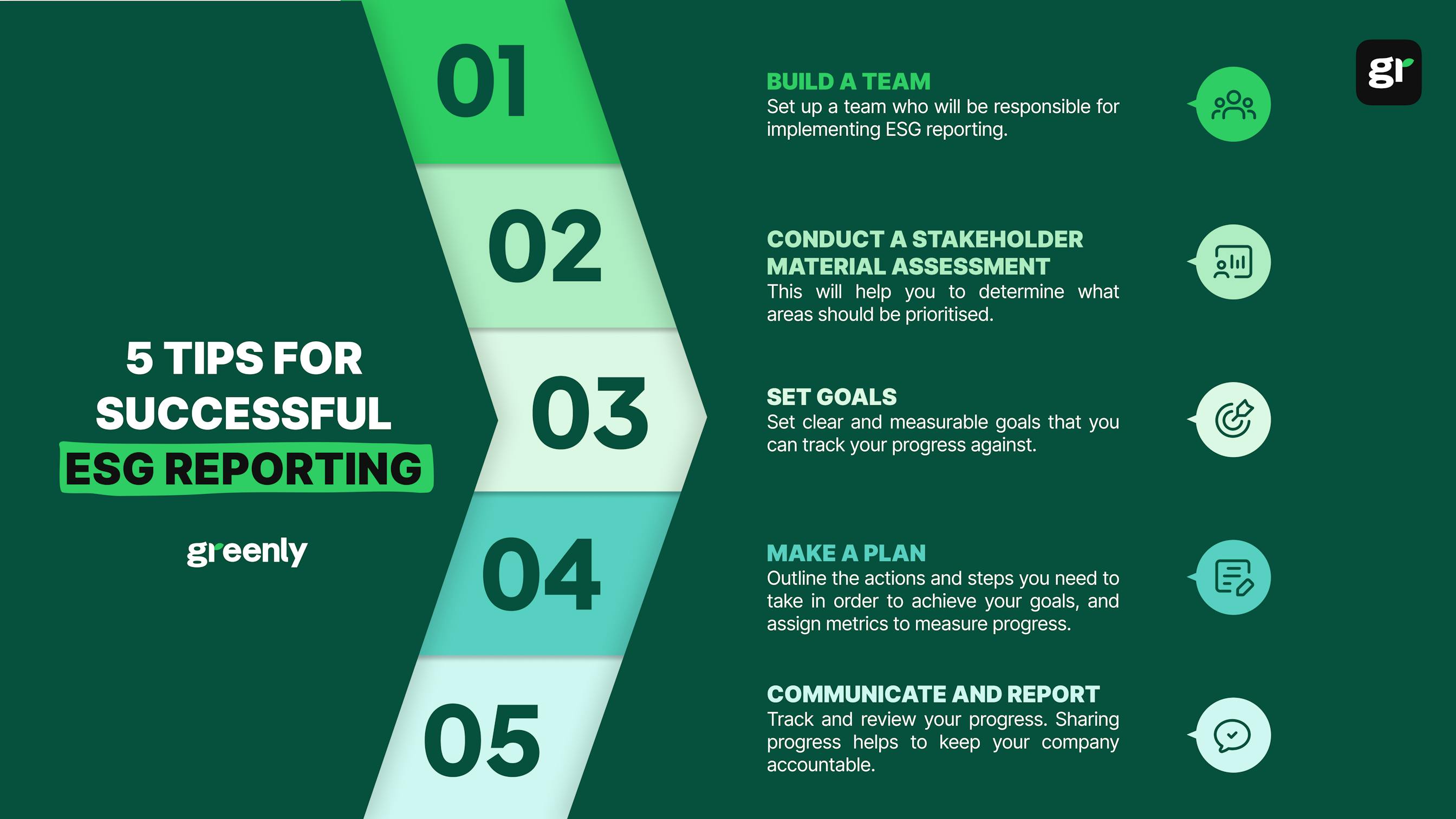
What are the 3 Pillars of Corporate Sustainability?
In this article, we'll explore what the 3 pillars of corporate responsibility are, why they're important, and how businesses can turn them into practical action.
ESG / CSR
Industries



ESG scores and ratings, otherwise known as data on a company's current responsibility and governance practices, can help companies to comply with regulations and international agreements in addition to committing to environmental impact social responsibility.
According to IBM's 2025 analysis, 98.6% of S&P 500 companies published sustainability reports in 2023 alone, revealing the growing trend to communicate progress on ESG data collected.
ESG performance is tired to a company's environmental impact, meaning that data can help companies interested in pursuing ESG data excellence to demonstrate measurable progress, attract investment capital, and build stakeholder trust through transparent reporting.
In fact, you may have heard that investors and other stakeholders care about your ESG score or rating, but why?
In this article, we'll explain what ESG data is, how ESG data is used, the different types of ESG data, how to disclose ESG data, and how ESG data could help your company improve its business performance long-term.
ESG data provides insight regarding the environmental, social, and governance (ESG) components or an organization or investment.
The ‘E’, ‘S’, ‘G’ in ESG data stands for, “Environmental, Social, and Governance” – otherwise known as the three key components that companies will use to determine the environmental efficacy and sustainability of their cooperation.
Measuring and reporting ESG data is a way for companies to establish transparency, trust, and accountability in their environmental goals so that they can appeal to future investors, employees and customers.
ESG is a beneficial for any organization working to improve upon their environmental, social, and governance goals – and can be used for tangible communication with employees, stakeholders, and other business partners.
The drop down sections below will further reveal the benefits of seeking to acquire new intel on social responsibility and governance in addition to environmental data:
New intel on workforce practices, community engagement, and DEI metrics helps companies enhance their social responsibility strategy and stay aligned with evolving expectations.
Governance data such as board diversity, anti-corruption efforts, or transparency ratings inform ethical leadership, risk mitigation, and long-term resilience.
Gathering consistent social and governance data alongside environmental metrics leads to stronger, more credible ESG disclosures — and better stakeholder trust.
Here are some additional benefits of seeking to prioritize and manage ESG data:
First of all, sharing respectable ESG data sets can help a business grow by establishing trust with governments for future funding, which in turn creates new business opportunities that would not be financially feasible otherwise.
The growth provided by government funding as a result of a good ESG data quality ultimately creates other lucrative opportunities – meaning recording and sharing ESG data will continue to create new pathways to success for any company or organization interested in growing their business.
ESG data is also profitable as it helps to provide employees with new experience and boost productivity, as reputable ESG data will allow companies to recruit and sustain motivated employees – which will overall better convey the company's business mission. Therefore ESG data vendors can also help with ESG investing and helping stakeholders to make an investment decision.
Think of it this way: when you go to a restaurant – you are more likely to return and leave a positive review if the waiter you had was friendly and created a warm dining experience, for you. The same is true of all businesses or companies, even if you aren't physically visiting the business or company.
For instance, when you have a kind, empathetic, and patient person and phone support for the product you bought that is malfunctioning – doesn't it make you want to remain a loyal customer, even if you had a technical difficulty?
ESG data will increase employee satisfaction, and therefore – increase customer loyalty, which will overall support the business in its continued growth.
An ESG score is a measurement of how well your company is operating across all components of ESG data: including economic, social, and governance factors.
The vertical timeline below will reveal the process of how ESG data is collected and an ESG score is distributed:
ESG reporting is when you share your ESG score and data with other investors, potential business partners, employees, and customers with the intent to establish greater transparency and promote corporate sustainability.
There are many benefits to ESG reporting, such as by how it demonstrates accountability in environmental social and governance and helps companies to align with the values depicted by the Global Reporting Initiative (GRI).
For instance, investors will often use ESG reporting to determine whether or not a company is an example of character in terms of reducing their carbon footprint – and if there are benefits to investing in a company with good ESG scores.
If your company decides to calculate and clearly define their carbon footprint through their ESG data, it could ultimately benefit their mission – as it provides precise numerical data regarding the reduction of their carbon footprint, and the ways the company sets out to seek environmental equity.
The flip cards below (move cursor over card to flip) will further breakdown the benefits of reporting ESG data:
While ESG reporting is optional, it can encourage investors to take part in your project by providing data pertaining to your carbon footprint.
The ‘E' in ESG reporting refers to the company's environmental energy usage: including carbon emissions, conservation of energy, animal treatment, water usage, and more.
A company's ESG data will be calculated through the amount of energy they use and its overall beneficial or negative impact to the environment.
If potential investors view the company as a poor example of moral character in terms of their willingness to be environmentally friendly – they may choose to invest in a company more willing to reduce their carbon footprint.
The ‘S' in ESG reporting refers to the company's social interactions – and how they reduce or do not reduce their carbon footprint throughout their communicative methods.
The ‘S' in a company's ESG score could be calculated on a number of factors: such as diversity, inclusivity, employee contribution, work expectations, gender equality, and customer satisfaction.
The ‘S' in the overall ESG score is imperative in the overall calculation, as no company can exist without its people – both customers and employees involved.
The ‘G' in ESG reporting refers to the company's “government” – in other words, how they manage and execute all of their business activities. This is also known as governance data.
For instance, this ESG information can be calculated based on the number of current or potential internal conflicts within the company.
This component of the over ESG score can also help determine if the company will be a valuable investment later on down the line after the investor's initial interest. In addition, this unstructured data can help rating agencies determine if companies are meeting regulatory requirements – such as regulatory reporting, providing a balance sheet when necessary, and complying with EU taxonomy.
The three way summary cards will break down the differences between environmental social and governance data collection in ESG:
Focuses on ESG factors like emissions, energy use, and resource consumption. Helps ESG data partners quantify environmental impact and track climate goals.
Covers inclusion initiatives, employee engagement, and human rights. Used to educate ESG data stakeholders on how company culture and policies affect society.
Includes executive pay, board diversity, and compliance metrics. Governance data helps assess leadership accountability and guides ESG data partners in risk analysis.

The main difference between ESG data and ESG reporting is that ESG data refers to the raw metrics regarding a company's performance on ESG, whereas ESG reporting is the process of organizing, analyzing, and communicating those sustainability metrics to stakeholders through structured reports and disclosures.
ESG data includes specific metrics such as company's energy usage, carbon emissions, labor practices, and board composition, while ESG reporting organizes this information from various data sources into structured reports that agencies use for ratings and analyst scoring.
The battle cards below will further break down the differences between ESG Data and ESG reporting:
Now that we've covered what an ESG score is, let's talk about why calculating and clearly defining ESG data and scores are crucial to a company's way to future success.
Collecting and reporting ESG data is important as investors don't usually have time to play detective and scope out every facet of every company in the working field. That's why sharing your ESG data can save both you and them the time and trouble of an investment not benefiting one another.
Here are some of the reasons why seeking to collect and report risk management, sustainability, and ESG data is indispensable in 2025:
An ESG score can help an investor clearly understand your company's mission and its overall effectiveness thus far.
Take work-life balance, for example. If a company has a lower ‘S' score within their already calculated ESG score – even if the other scores have excellent results, an investor may strongly value that the employees in a company have the proper time to take vacations and get their mind off of work so that they may return to the office rejuvenated with new ideas and be ready to take stronger action after proper rest & relaxation.
These reports allow investors to view your company as a whole, so that they may make a calculated decision whether this is the right investment for them.
Trust is a difficult component to find solace with just about anything in life: relationships, strenuous situations, and of course – jobs, especially in recruiting and employee retention. It's easy for a company to say that they care about the environment, but numerical data doesn't lie – and can make or break trust for data partners and providers.
An ESG score can help make things crystal clear to see who really plays their part to reduce their carbon footprint.
If everyone says they care about the environment, and many of those companies claiming this really do reduce their carbon footprint – how does a decision get regarding data in ESG ratings get made?
An ESG score can help an investor determine who has made the strongest efforts to reduce their carbon footprint and benefit the environment. Remember – people tell lies, but calculated numbers don't!
Therefore, anything a company says regarding their carbon footprint can be revealed with the use of an ESG score. Anyone can say their thumb is green – but an ESG score will show who is really dedicated to finding as many ways to benefit the environment as possible.
This is ultimately why an ESG score is so beneficial in allowing an investor to understand your company's overall carbon footprint.



Committing to measuring and making ESG data available to the public provides a great sense of trust for future investors and customers – which ultimately increase revenue and open new business opportunities.
Considering ESG data outputs has a direct correlation to corporate sustainability. In other words, if your company can establish a routine of calculating your ESG data and reporting it to all future investors, employees, and customers – it ultimately establishes a greater sense of trust between all third parties that contribute to your business.
This newfound trust from seeking to determine ESG scores and working with ESG data will allow for the other sectors of your business to grow, which allows all three pillars of corporate sustainability – environmental, economic, and social – to flourish and prosper. Furthermore, seeking to manage ESG issues may allow companies to mitigate risks, boost supply chain resilience, and achieve industry benchmarks with ease in comparison to competitors who fail to delegate ESG or sustainability.
The flip cards (move cursor over card to flip) below will reveal the additional benefits of ESG data for your company and its long-term success:
Overall, maintaining your ESG score as accessible information to third parties is an easy first step to establishing a more environmentally friendly business.

If your organization has started to reduce your carbon footprint, but don't know the step-by-step process used to determine ESG scores – read more below on how to share your reduced-carbon-footprint-calculation with the world.
The first step to success in your ESG reporting is your strategy.
You should take calculated steps to use your company's mission to your advantage for an overall better ESG score. Remember, effective ESG reporting requires aligning your sustainability data with your company's main mission, products, and services.
For example, if your company is a vegan restaurant – don't talk about how little electricity you use, but talk about how much less water you are using to cook your meals as a result of plant-based cooking – and how this is ultimately reducing your carbon footprint.
The next step to success in your ESG reporting is your approach.
Is the current plan to reduce your carbon footprint being well executed, or is it time for Plan B?
It is integral to your company's ESG score to constantly assess if the current measures you are taking to reduce your carbon footprint are proving successful.
Don't be afraid to think of or try new ways to benefit your company and the environment.
The next step to success in your ESG reporting is how you implement your values into reducing your carbon footprint.
The components of a well calculated ESG score shouldn't be thought of as another to-do-list, but should rather be made as an effort to seamlessly implement the values and defining characteristics of an ESG score into your company.
For example, if you have a make-up brand with select cruelty-free products – make an effort to transform some of your current products to have new, more environmentally friendly options.
This will show investors not only continued creativity and diligence, but a strong sense of urgency to find new, innovative ways to reduce your carbon footprint.

The next step to success in your ESG reporting is your willingness to publicly share those ESG scores.
If your company has already started to share their ESG scores – don't stop!
The key to success is your willingness to sustain and even improve upon your current scores, and more importantly – to share your calculations with others to communicate your progress, especially to ESG data partners and providers.
The last step to success in your ESG reporting is your to remain dedication to both current and future issues that could impact your ESG score
Collecting a lot of data can mean a lot of questions. So, it's important to stay ahead of any potential issues – as this will show investors how dedicated you are to helping the environment.
Dedication to ensuring the calculations for your ESG data is accurate and up to date will delineate your company's passion towards carbon footprint reduction.
Overall, if you're looking for a way to share how you reduce your carbon footprint with others, such as future investors – measuring and reporting your ESG data is the way to achieve both your company's environmental and financial goals.
If reading this article about ESG data and reporting has made you interested in reducing your carbon emission to further fight against climate change – Greenly can help you!
Greenly can help you make an environmental change for the better, starting with a carbon footprint assessment to know how much carbon emissions your company produces.
Don't wait any longer, take the first step towards reducing your carbon footprint by requesting a free and non-binding demo with one of our experts today and finding the solution that best fits your business needs.